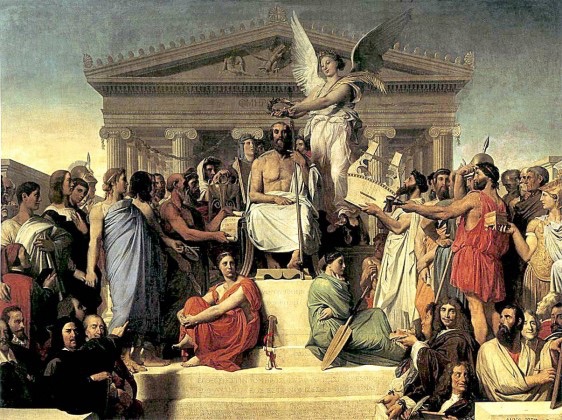The Legendary, the Mysterious, and the Gallant: The Gods and Goddesses of Greece

In 2013, Percy Jackson: The Lightning Thief hit the big screen. Grossing 226.4 million dollars, the film was a success. At least in the technical sense it was. Many fans of the beloved Percy Jackson books series beg to differ. Complaints range from Annabeth’s hair being the wrong color to the main characters looking way too old for the ages they were supposed to play. But, hopefully, later this year the book series will be redeemed. Rick Riordan, along with Jon Stienburg, who is best known for his production of Black Sails, are working to create a tv series for Disney+. The show is said to run for 3 seasons.
For me, personally, it’s been a bit since I last read Percy Jackson. But, one thing I do remember was that the Greek gods and goddesses played a big role in a lot of the books. Before the show comes out, here is a brief refresher on (most) of the gods and goddesses.
We start off with Zeus. Zeus! How could anyone forget Zeus? This mighty god had two names, as do most of the gods and goddesses on this list. His Greek name is Zeus and his Roman name was Jupiter. He is the king of the gods as well as the god of the sky. He wielded the mighty lightning bolt. Zeus was also one of the sons of the Titans Cronus and Rhea. He is wed to his wife (and sister!) Hera, although he does not have a reputation of being the most faithful to her.
The next god on the list is Poseidon. He is the brother of Zeus as well as the father of Percy Jackson. His wife’s name is Amphitrite; who is the granddaughter of the Titan, Ocean (I guess that makes them cousins?). His Greek name is Poseidon and his Roman name is Neptune. Like his all powerful brother, he also has a weapon he’s usually depicted with. That weapon is the trident; an oversized three pronged fork.
The final son of Cronus and Rhea, Hades. He is married to Persephone, who is the daughter of Demeter. His Roman name is Pluto while his Greek name is Hades. Fun fact, the name Hades has also been used as a name for the Underworld. Unlike his two brothers, Hades didn’t necessarily have a weapon. Instead, he had a helmet that allowed for the wearer to become invisible.
Moving swiftly along to the daughters of the Titans, we have Hera (otherwise known as Juno). According to the book The Classic Bestseller MYTHOLOGY Timeless Tales of Gods and Heroes (lengthy, I know), it states, “…married women were her peculiar care.” Strangely enough, Hera is often depicted as a very jealous person and she constantly punishes the women Zeus slept with, not Zeus himself. But, I digress.
Demeter, the goddess of agriculture. She’s one of the more important goddesses to the people of Ancient Greece, since she dictated whether or not their harvests went well or not. Demeter is also the mother of Persephone. When Hades originally kidnapped her daughter, Demeter was devastated and she caused the plants to die. Because of this, no one could grow anything and the world was thrown into a famine. Humans couldn’t live like this, so the gods got together and decided that Persephone will stay with Demeter for half the year and spend the other half with her husband. This is how we have seasons.
Despite the order of the list, Hestia is considered to be the first born of Cronus and Rhea. She’s one of the few maidan (or virgin) goddesses (the other two being Artemis and Athena). Her Roman name is Vesta. There isn’t too much information on Hestia since she didn’t play many major roles in Greek Mythology, but a fun fact about her is that both Apollo and Posedian wanted to marry her, but she refused them both.
Moving onto the children of the first six gods and goddesses, we have Athena. She’s the child of Zeus and Zeus alone. As the myth states, she sprang from Zeus’ forehead as a fully clothed adult. She then goes on to become the goddess of wisdom and war, which she shares with her brother, Ares. Her Roman name is Minerva. Typically, Athena is described as “gray eyed” or sometimes even “flashing-eyed”.
One of Zeus’ twins, Apollo is the god of music, the sun, and poetry. Unlike most of the other gods and goddesses on this list, Apollo’s Greek and Roman names are the same. Apollo is typically depicted riding his chariot across the sky and this is how the sun rises and sets each day.
Now we have Zeus’ other twin, Artemis. Her Roman name is Diana and she’s one of the three maiden goddesses. Instead of a husband, Artemis has her own hunters called the Hunters of Artemis. These are women (who can be human, gods, nymphs, or anything) who have sworn off marriage and pledge themselves to Artemis. She is typically depicted with a bow and arrow, similar to her brother.
Born of sea foam, Aphrodite is the goddess of love and she’s also known to be the fairest of all the goddesses. Her Roman name is Venus. She is married to the fire god, Hephaestus, although she is in love with Ares, the god of war. Sometimes, she is seen as the goddess of the sea, since she was born from sea foam.
One of the only children Zeus had with Hera is Ares (otherwise known as Mars). Like his sister, he is also a god of war except he is the god of bloody and brutal warfare. He was mostly worshiped in Sparta and human sacrifices were commonly made to the vicious god. But, other than in Sparta, he wasn’t heavily worshiped, nor was he liked by either of his parents. His bird was a vulture and the dog was his animal.
The other child of Zeus and Hera, Hephaestus. He is known for his looks (or rather, the looks he lacked) and his extensive work in the forge. Hephaestus has made many weapons for gods and humans alike. He is the patron god for many blacksmiths and craftsmen. His Roman name was Vulcan.
Hermes is one of the sons of Zeus and is typically said to be the most Greek out of all the gods and goddesses. His Roman name is Mercury. Hermes, with his winged shoes, is the fastest of all the gods. He is said to be very lucky, therefore if you needed luck one would go to him first. Hermes is also credited with the creation of the lyre, which is said to be one of Apollo’s instruments.
Also known as Bacchus, Dionysius is known as the god of wine. Like Demeter, he was very loved throughout Greece. He is usually depicted as a fun loving god, but on occasion he is seen to be ruthless. This mirrors the effects of wine, it can be used to have a good time but in excess it can have awful effects. For example, Dionysius is known to have a group of women worshippers called maenads who live in the woods. They typically dress in fawn skins, ivy, and carry around a long stick covered in ivy and topped with a pine cone.
Those are the 13 most important gods and goddesses in Greek Mythology. Of course, there’s many others that you can read about, along with the many many Greek Heroes, like Jason or Odysseus.










